Unit 8 Pets Grammar 课件(共40张PPT)
文档属性
| 名称 | Unit 8 Pets Grammar 课件(共40张PPT) |  | |
| 格式 | zip | ||
| 文件大小 | 2.0MB | ||
| 资源类型 | 教案 | ||
| 版本资源 | 牛津译林版 | ||
| 科目 | 英语 | ||
| 更新时间 | 2022-05-31 20:41:27 | ||
图片预览



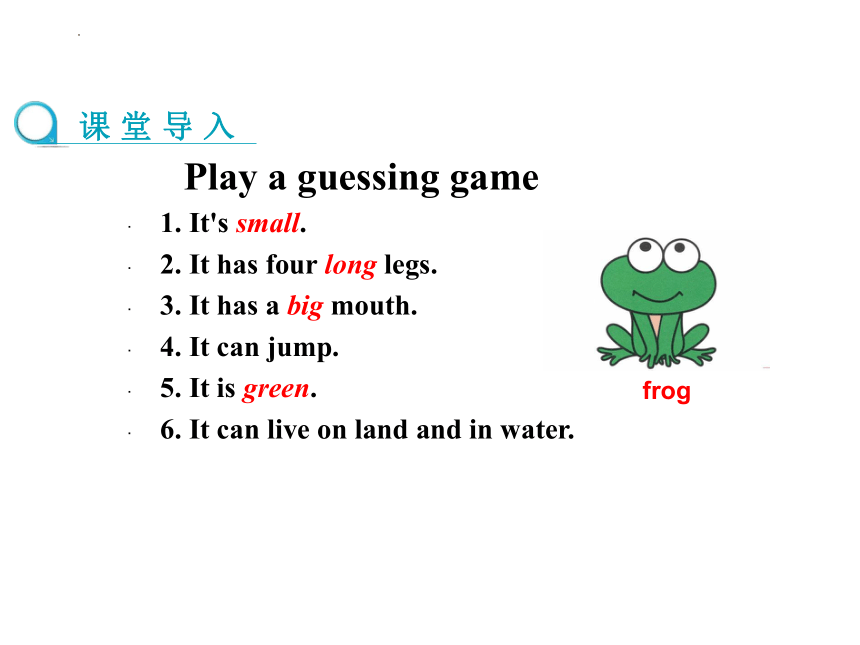
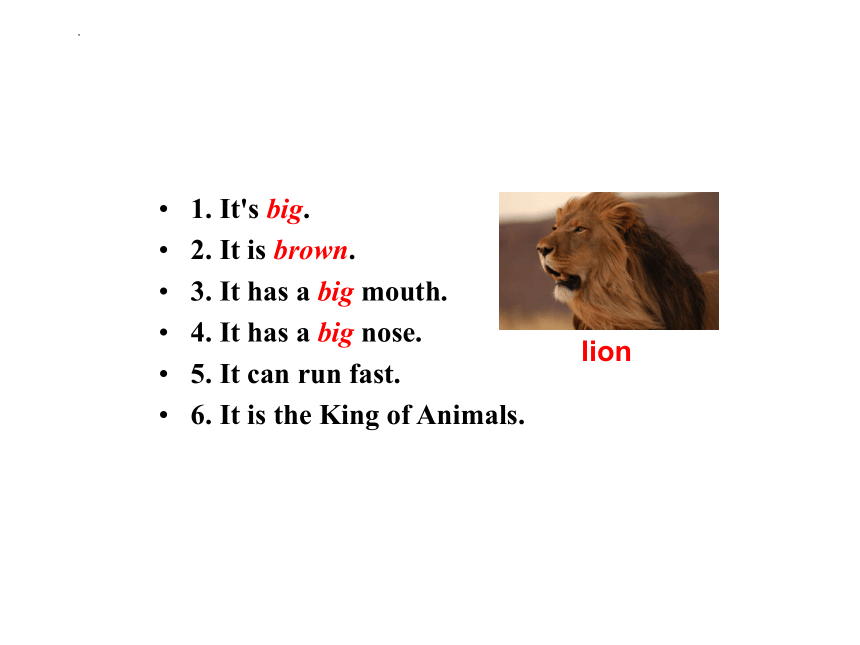

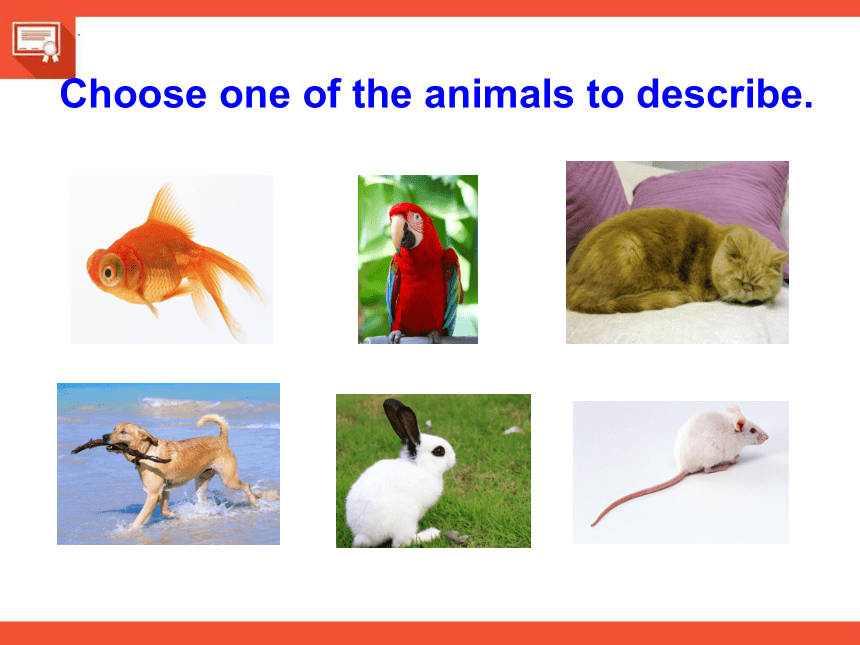
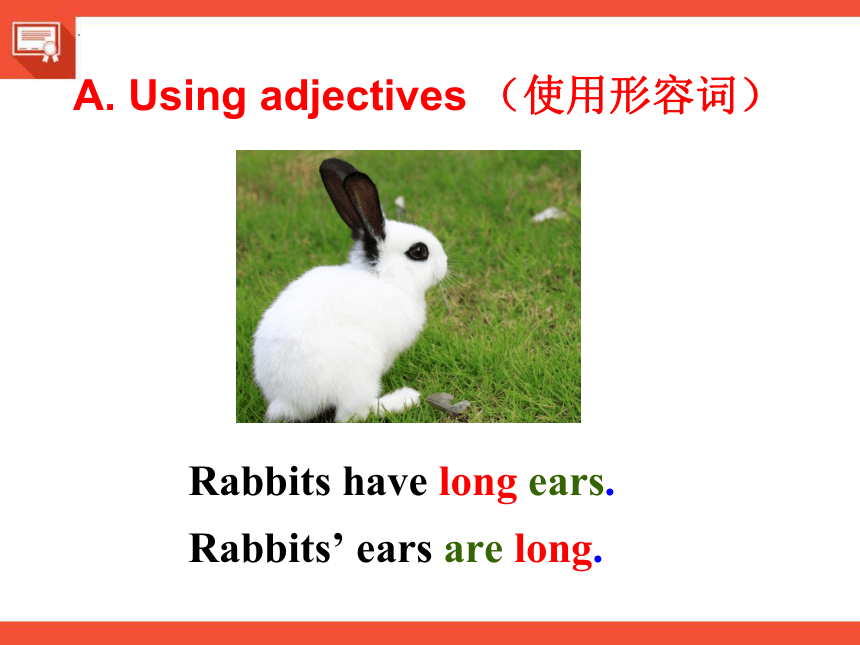
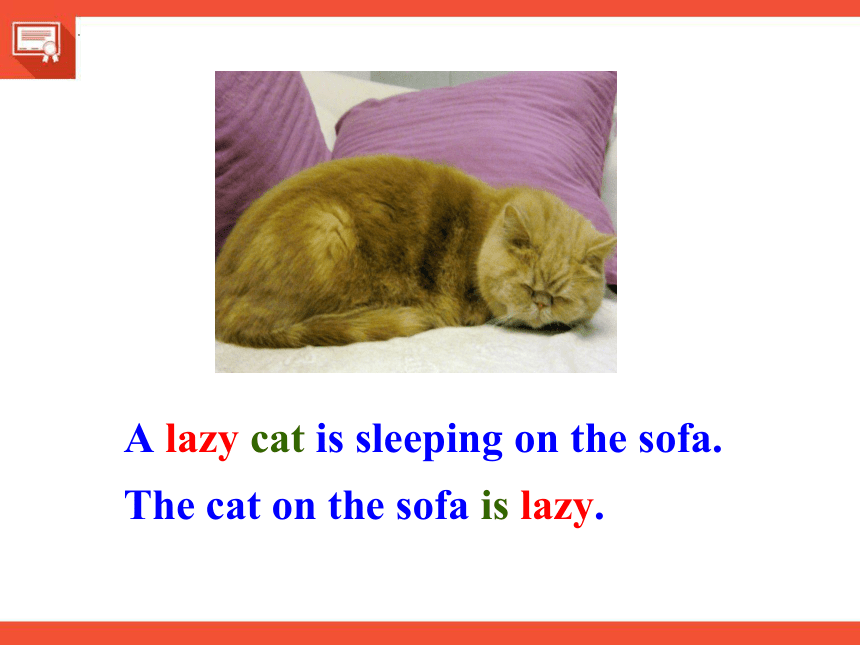


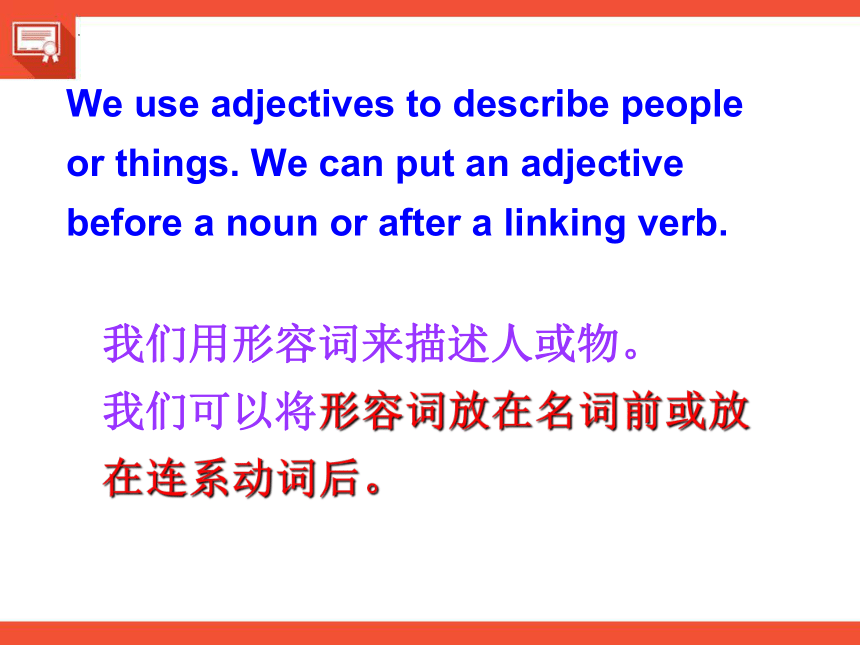
文档简介
(共40张PPT)
Unit 8
Grammar
anywhere adv. 任何地方
repeat vt. & vi. 重复
all the time 一直,总是
agree vi. & vt. 同意;应允
keep vt. 养,饲养
Read aloud these new words.
Play a guessing game
1. It's small.
2. It has four long legs.
3. It has a big mouth.
4. It can jump.
5. It is green.
6. It can live on land and in water.
课 堂 导 入
frog
1. It's big.
2. It is brown.
3. It has a big mouth.
4. It has a big nose.
5. It can run fast.
6. It is the King of Animals.
lion
1. It's tall.
2. It's thin.
3. It has a long neck.
4. It has two small ears.
5. It has four long legs.
6. It can run very fast.
giraffe
Choose one of the animals to describe.
A. Using adjectives (使用形容词)
Rabbits have long ears.
Rabbits’ ears are long.
A lazy cat is sleeping on the sofa.
The cat on the sofa is lazy.
Rabbits has _____ ears.
A _____ cat is sleeping on the sofa.
The bird can make ____
sounds.
nice
There are five_____ dogs on the sofa.
cute
lazy
adjective + noun(名词)
long
The cat on the sofa is ____.
lazy
The bird sounds
nice
The dogs on the sofa look
____.
cute
The fish smell____.
a linking verb(系动词)+ adjective
bad
我们用形容词来描述人或物。
我们可以将形容词放在名词前或放在连系动词后。
We use adjectives to describe people or things. We can put an adjective before a noun or after a linking verb.
形容词的定义:表示人或事物的属性或特征的词叫形容词(adjective)。
2、形容词的用法
形容词常修饰名词
它的基本作用就是提供更多关于名词的信息
表示人或事物的特征,状态和特征
意为:……的
She is an excellent teacher. 她是一位优秀的老师(作定语)
Mary is very lovely.玛丽很可爱。(作表语)
形容词的位置
(1)形容词一般放在名词前作定语,它们的前面常常带有冠词、形容词性物主代词、指示代词、数词等。
a red flower一朵红花 this interesting story这个有趣的故事
six blind men 六个盲人 my own house我自己的房子
(2)形容词修饰不定代词时,常常后置。
something interesting 一些有趣的事
(3)形容词在be, seem, look, taste, smell, feel, sound, appear, turn等系动词后作表语。
The leaves turned yellow. 叶子变黄了。
Linking werbs:
辅助主语的动词,本身有词义,但不能单独做谓语,后必须加表语(形容词居多),构成系表结构
状态系动词 be
持续系动词 keep,stay
感官系动词 feel,smell,sound,taste
变化系动词 become,tern,get,grow,come
……
注意:
1、只能做表语,e.g. alone,afraid,asleep.
2、在句中的位置(限观形龄颜国材)
限:限定词,一般描绘性形容词
观:大小,长短,高低
形:形状
龄:年龄,新旧
颜:色彩
国:国籍,地区,出处
材:物质,材料,用途,类别
1. make/ Birds/sounds/ nice
__________________________
2. are/ clever/ Dogs/ and / friendly ___________________________
3. and/ quiet/ Goldfish/ look after/ to / are/ easy
__________________________________
Birds make nice sounds.
Dogs are clever and friendly.
Goldfish are quiet and easy to look after.
Daniel is making some notes about pets. Help him make sentences with the words below.
black clever happy
hungry special tired
Daniel found two passages about
pets on the plete the
sentences with the words in the box.
I have a _____ cat. She likes to run after balls. When she gets ____, she sleeps anywhere. She miaows when she is ______.
My parrot is a ______ friend of mine. He is very _____, and he can repeat my words. He says “Hello!” when I come back home. He is _____ all the time.
black
tired
hungry
special
clever
happy
当我们不知道或没有必要说明所谈论的人是谁或是什么事物时,我们就用不定代词来指代人或物。
B. Indefinite pronouns (不定代词)
We use indefinite pronouns to refer to people and things when we do not know or do not need to mention who or what we are talking about.
I saw ___________________ (有人) in the house.
How to use indefinite pronouns
somebody (=someone)
There is ____________ (某个东西)under the bed.
something
We use somebody, someone and something in positive sentences.
When we are offering something or when we expect the answer to be ‘yes’, we can use something, somebody/ someone in questions.
Would you like something to eat
Is someone there
I did not see _________________(有人)in the house.
anybody (=anyone)
There is not ________(某个东西)under the bed.
anything
We use anybody, anyone and anything in negative sentences or in questions.
Do you feed your goldfish ________(某物)else?
anything
There is ________________(没人)in the living room.
nobody (= no one)
I saw _______(没东西)in the fridge.
nothing
We use nobody, no one and nothing to refer to ‘not anyone’ and ‘not anything’.
There isn’t anybody in the room.
= There is _____________ in the room.
I did not hear anything. = I heard _______.
nobody/no one
nothing
Is _________________ (每个人) here today
__________ (每样东西) is ready.
everybody/everyone
Everything
We use everybody, everyone and everything to refer to ‘all people’ and ‘all things’.
Mr Hu is asking the students about their plete their conversation with the correct indefinite pronouns.
Mr Wu: Millie, I know you have a dog. What do you feed him
Millie: We usually give him dog food.
Mr Wu: Do you feed him ________ else
Millie: Yes. Sometimes we give him some meat. He likes it.
Mr Wu: I see. Does ________________ have a cat
Amy: Yes, I have a cat. She’s nice to ____________________.
Mr Wu: Good. I know _________________ has goldfish, right
anything
anyone (anybody)
everybody (everyone)
somebody (someone)
Peter: Yes, I do. Goldfish are easy to look after.
Mr Wu: That’s true. Does ______________ have a snake
Kitty: No. _______________ wants a snake, I think.
Daniel: I don’t agree. There’s _______ wrong with keeping a snake if you like it.
nothing
anyone (anybody)
Nobody (No one)
形容词
定义 用来表示人或事物特征、性质的词。
用法 1. 放在名词前(作定语)。 2. 放在连系动词后(作表语)。
举例 It’s a nice gift. He is very friendly.
You look tired today.
一、形容词用法
小结
指人 somebody/someone anybody/ anyone nobody/ no one everybody/ everyone
指物 something anything nothing everything
用法 用肯定句以及表示期待对方给予肯定回答的问句中。 用于否定句、疑问句以及表示强调的肯定句中。 在句中用来表示否定,相当于not any- 表示所有的人或物。
备注 1. 所有不定代作主语时谓语动词用单数形式 2. 形容词修饰不定代词时,形容词要后置。
二、不定代词:用来指不定数量或范围的人或物。
e.g.
Someone _____ (want) to see you at the school gate.
There __ (be) nothing wrong with the car.
Mother will buy me _________ ____
(好吃的东西) this afternoon.
How is __________ (一切) going
wants
is
something nice
everything
She eats nothing in the morning.
= She _______ ___ ________ in the morning.
doesn’t eat anything
1. There is not ________ (something) in the box.
2. I’m glad to see that _________ (somebody) is here today.
3. _______ (anything) is difficult if you put your heart into it.
4. People in the shop are _______ (friend) to us.
5. Tom is the _______ (clever) boy in the class.
I. Fill in the blanks with correct form.
anything
everybody
Nothing
friendly
cleverest
Exercises
1. Hobo叫Eddie不要对他不礼貌。
Hobo asks Eddie not to _______ to him.
2. 我的狗是我的一位特殊朋友。
My dog is a ___________________.
3. 金鱼很容易照看。
Goldfish are ________________.
4. 如果你喜欢,养蛇也没什么不对。
There’s _______ wrong with _______
_______ if you like.
special friend of mine
be rude
easy to look after
a snake
nothing
keeping
plete the sentences.
1.句型转换
(1)There's nobody in the classroom.(改为同义句)
There________ ________ in the classroom.
(2)Uncle Xiao didn't say anything at the meeting. (改为同义句)
Uncle Xiao________ ________ at the meeting.
isn't anybody
said nothing
活 学 活 用
(3)There is something wrong with your computer.(改为否定句)
There is________ ________ with your computer.
nothing wrong
2.单项选择
(1)2019· 随州 —Do you love your parents
—Yes, of course. ________ in my life is more important than them.
A. Something B.Anything
C.Everything D.Nothing
D
(2)2019· 盐城________ needs one or two close friends to share his happiness and sadness with.
A.Someone B.No one
C.None D.Everyone
D
(3)2019·湘西改编—Helen, did you do ________ last weekend
—Yes, I visited my grand parents in the countryside.
A.anything special
B.something special
C.special anything
D.special something
A
Remember the use of adjectives and the indefinite pronouns.
Preview the new words in the next lesson.
Unit 8
Grammar
anywhere adv. 任何地方
repeat vt. & vi. 重复
all the time 一直,总是
agree vi. & vt. 同意;应允
keep vt. 养,饲养
Read aloud these new words.
Play a guessing game
1. It's small.
2. It has four long legs.
3. It has a big mouth.
4. It can jump.
5. It is green.
6. It can live on land and in water.
课 堂 导 入
frog
1. It's big.
2. It is brown.
3. It has a big mouth.
4. It has a big nose.
5. It can run fast.
6. It is the King of Animals.
lion
1. It's tall.
2. It's thin.
3. It has a long neck.
4. It has two small ears.
5. It has four long legs.
6. It can run very fast.
giraffe
Choose one of the animals to describe.
A. Using adjectives (使用形容词)
Rabbits have long ears.
Rabbits’ ears are long.
A lazy cat is sleeping on the sofa.
The cat on the sofa is lazy.
Rabbits has _____ ears.
A _____ cat is sleeping on the sofa.
The bird can make ____
sounds.
nice
There are five_____ dogs on the sofa.
cute
lazy
adjective + noun(名词)
long
The cat on the sofa is ____.
lazy
The bird sounds
nice
The dogs on the sofa look
____.
cute
The fish smell____.
a linking verb(系动词)+ adjective
bad
我们用形容词来描述人或物。
我们可以将形容词放在名词前或放在连系动词后。
We use adjectives to describe people or things. We can put an adjective before a noun or after a linking verb.
形容词的定义:表示人或事物的属性或特征的词叫形容词(adjective)。
2、形容词的用法
形容词常修饰名词
它的基本作用就是提供更多关于名词的信息
表示人或事物的特征,状态和特征
意为:……的
She is an excellent teacher. 她是一位优秀的老师(作定语)
Mary is very lovely.玛丽很可爱。(作表语)
形容词的位置
(1)形容词一般放在名词前作定语,它们的前面常常带有冠词、形容词性物主代词、指示代词、数词等。
a red flower一朵红花 this interesting story这个有趣的故事
six blind men 六个盲人 my own house我自己的房子
(2)形容词修饰不定代词时,常常后置。
something interesting 一些有趣的事
(3)形容词在be, seem, look, taste, smell, feel, sound, appear, turn等系动词后作表语。
The leaves turned yellow. 叶子变黄了。
Linking werbs:
辅助主语的动词,本身有词义,但不能单独做谓语,后必须加表语(形容词居多),构成系表结构
状态系动词 be
持续系动词 keep,stay
感官系动词 feel,smell,sound,taste
变化系动词 become,tern,get,grow,come
……
注意:
1、只能做表语,e.g. alone,afraid,asleep.
2、在句中的位置(限观形龄颜国材)
限:限定词,一般描绘性形容词
观:大小,长短,高低
形:形状
龄:年龄,新旧
颜:色彩
国:国籍,地区,出处
材:物质,材料,用途,类别
1. make/ Birds/sounds/ nice
__________________________
2. are/ clever/ Dogs/ and / friendly ___________________________
3. and/ quiet/ Goldfish/ look after/ to / are/ easy
__________________________________
Birds make nice sounds.
Dogs are clever and friendly.
Goldfish are quiet and easy to look after.
Daniel is making some notes about pets. Help him make sentences with the words below.
black clever happy
hungry special tired
Daniel found two passages about
pets on the plete the
sentences with the words in the box.
I have a _____ cat. She likes to run after balls. When she gets ____, she sleeps anywhere. She miaows when she is ______.
My parrot is a ______ friend of mine. He is very _____, and he can repeat my words. He says “Hello!” when I come back home. He is _____ all the time.
black
tired
hungry
special
clever
happy
当我们不知道或没有必要说明所谈论的人是谁或是什么事物时,我们就用不定代词来指代人或物。
B. Indefinite pronouns (不定代词)
We use indefinite pronouns to refer to people and things when we do not know or do not need to mention who or what we are talking about.
I saw ___________________ (有人) in the house.
How to use indefinite pronouns
somebody (=someone)
There is ____________ (某个东西)under the bed.
something
We use somebody, someone and something in positive sentences.
When we are offering something or when we expect the answer to be ‘yes’, we can use something, somebody/ someone in questions.
Would you like something to eat
Is someone there
I did not see _________________(有人)in the house.
anybody (=anyone)
There is not ________(某个东西)under the bed.
anything
We use anybody, anyone and anything in negative sentences or in questions.
Do you feed your goldfish ________(某物)else?
anything
There is ________________(没人)in the living room.
nobody (= no one)
I saw _______(没东西)in the fridge.
nothing
We use nobody, no one and nothing to refer to ‘not anyone’ and ‘not anything’.
There isn’t anybody in the room.
= There is _____________ in the room.
I did not hear anything. = I heard _______.
nobody/no one
nothing
Is _________________ (每个人) here today
__________ (每样东西) is ready.
everybody/everyone
Everything
We use everybody, everyone and everything to refer to ‘all people’ and ‘all things’.
Mr Hu is asking the students about their plete their conversation with the correct indefinite pronouns.
Mr Wu: Millie, I know you have a dog. What do you feed him
Millie: We usually give him dog food.
Mr Wu: Do you feed him ________ else
Millie: Yes. Sometimes we give him some meat. He likes it.
Mr Wu: I see. Does ________________ have a cat
Amy: Yes, I have a cat. She’s nice to ____________________.
Mr Wu: Good. I know _________________ has goldfish, right
anything
anyone (anybody)
everybody (everyone)
somebody (someone)
Peter: Yes, I do. Goldfish are easy to look after.
Mr Wu: That’s true. Does ______________ have a snake
Kitty: No. _______________ wants a snake, I think.
Daniel: I don’t agree. There’s _______ wrong with keeping a snake if you like it.
nothing
anyone (anybody)
Nobody (No one)
形容词
定义 用来表示人或事物特征、性质的词。
用法 1. 放在名词前(作定语)。 2. 放在连系动词后(作表语)。
举例 It’s a nice gift. He is very friendly.
You look tired today.
一、形容词用法
小结
指人 somebody/someone anybody/ anyone nobody/ no one everybody/ everyone
指物 something anything nothing everything
用法 用肯定句以及表示期待对方给予肯定回答的问句中。 用于否定句、疑问句以及表示强调的肯定句中。 在句中用来表示否定,相当于not any- 表示所有的人或物。
备注 1. 所有不定代作主语时谓语动词用单数形式 2. 形容词修饰不定代词时,形容词要后置。
二、不定代词:用来指不定数量或范围的人或物。
e.g.
Someone _____ (want) to see you at the school gate.
There __ (be) nothing wrong with the car.
Mother will buy me _________ ____
(好吃的东西) this afternoon.
How is __________ (一切) going
wants
is
something nice
everything
She eats nothing in the morning.
= She _______ ___ ________ in the morning.
doesn’t eat anything
1. There is not ________ (something) in the box.
2. I’m glad to see that _________ (somebody) is here today.
3. _______ (anything) is difficult if you put your heart into it.
4. People in the shop are _______ (friend) to us.
5. Tom is the _______ (clever) boy in the class.
I. Fill in the blanks with correct form.
anything
everybody
Nothing
friendly
cleverest
Exercises
1. Hobo叫Eddie不要对他不礼貌。
Hobo asks Eddie not to _______ to him.
2. 我的狗是我的一位特殊朋友。
My dog is a ___________________.
3. 金鱼很容易照看。
Goldfish are ________________.
4. 如果你喜欢,养蛇也没什么不对。
There’s _______ wrong with _______
_______ if you like.
special friend of mine
be rude
easy to look after
a snake
nothing
keeping
plete the sentences.
1.句型转换
(1)There's nobody in the classroom.(改为同义句)
There________ ________ in the classroom.
(2)Uncle Xiao didn't say anything at the meeting. (改为同义句)
Uncle Xiao________ ________ at the meeting.
isn't anybody
said nothing
活 学 活 用
(3)There is something wrong with your computer.(改为否定句)
There is________ ________ with your computer.
nothing wrong
2.单项选择
(1)2019· 随州 —Do you love your parents
—Yes, of course. ________ in my life is more important than them.
A. Something B.Anything
C.Everything D.Nothing
D
(2)2019· 盐城________ needs one or two close friends to share his happiness and sadness with.
A.Someone B.No one
C.None D.Everyone
D
(3)2019·湘西改编—Helen, did you do ________ last weekend
—Yes, I visited my grand parents in the countryside.
A.anything special
B.something special
C.special anything
D.special something
A
Remember the use of adjectives and the indefinite pronouns.
Preview the new words in the next lesson.
